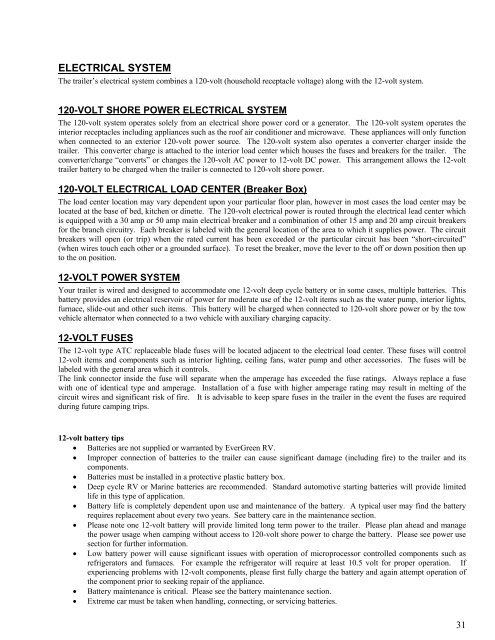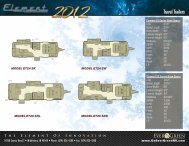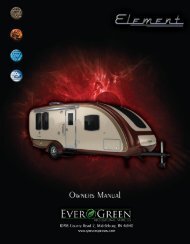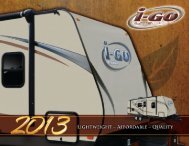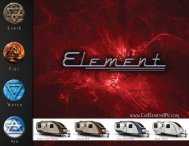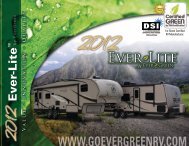EverGreen Owner's Manual
EverGreen Owner's Manual
EverGreen Owner's Manual
You also want an ePaper? Increase the reach of your titles
YUMPU automatically turns print PDFs into web optimized ePapers that Google loves.
ELECTRICAL SYSTEM<br />
The trailer’s electrical system combines a 120-volt (household receptacle voltage) along with the 12-volt system.<br />
120-VOLT SHORE POWER ELECTRICAL SYSTEM<br />
The 120-volt system operates solely from an electrical shore power cord or a generator. The 120-volt system operates the<br />
interior receptacles including appliances such as the roof air conditioner and microwave. These appliances will only function<br />
when connected to an exterior 120-volt power source. The 120-volt system also operates a converter charger inside the<br />
trailer. This converter charge is attached to the interior load center which houses the fuses and breakers for the trailer. The<br />
converter/charge “converts” or changes the 120-volt AC power to 12-volt DC power. This arrangement allows the 12-volt<br />
trailer battery to be charged when the trailer is connected to 120-volt shore power.<br />
120-VOLT ELECTRICAL LOAD CENTER (Breaker Box)<br />
The load center location may vary dependent upon your particular floor plan, however in most cases the load center may be<br />
located at the base of bed, kitchen or dinette. The 120-volt electrical power is routed through the electrical lead center which<br />
is equipped with a 30 amp or 50 amp main electrical breaker and a combination of other 15 amp and 20 amp circuit breakers<br />
for the branch circuitry. Each breaker is labeled with the general location of the area to which it supplies power. The circuit<br />
breakers will open (or trip) when the rated current has been exceeded or the particular circuit has been “short-circuited”<br />
(when wires touch each other or a grounded surface). To reset the breaker, move the lever to the off or down position then up<br />
to the on position.<br />
12-VOLT POWER SYSTEM<br />
Your trailer is wired and designed to accommodate one 12-volt deep cycle battery or in some cases, multiple batteries. This<br />
battery provides an electrical reservoir of power for moderate use of the 12-volt items such as the water pump, interior lights,<br />
furnace, slide-out and other such items. This battery will be charged when connected to 120-volt shore power or by the tow<br />
vehicle alternator when connected to a two vehicle with auxiliary charging capacity.<br />
12-VOLT FUSES<br />
The 12-volt type ATC replaceable blade fuses will be located adjacent to the electrical load center. These fuses will control<br />
12-volt items and components such as interior lighting, ceiling fans, water pump and other accessories. The fuses will be<br />
labeled with the general area which it controls.<br />
The link connector inside the fuse will separate when the amperage has exceeded the fuse ratings. Always replace a fuse<br />
with one of identical type and amperage. Installation of a fuse with higher amperage rating may result in melting of the<br />
circuit wires and significant risk of fire. It is advisable to keep spare fuses in the trailer in the event the fuses are required<br />
during future camping trips.<br />
12-volt battery tips<br />
• Batteries are not supplied or warranted by <strong>EverGreen</strong> RV.<br />
• Improper connection of batteries to the trailer can cause significant damage (including fire) to the trailer and its<br />
components.<br />
• Batteries must be installed in a protective plastic battery box.<br />
• Deep cycle RV or Marine batteries are recommended. Standard automotive starting batteries will provide limited<br />
life in this type of application.<br />
• Battery life is completely dependent upon use and maintenance of the battery. A typical user may find the battery<br />
requires replacement about every two years. See battery care in the maintenance section.<br />
• Please note one 12-volt battery will provide limited long term power to the trailer. Please plan ahead and manage<br />
the power usage when camping without access to 120-volt shore power to charge the battery. Please see power use<br />
section for further information.<br />
• Low battery power will cause significant issues with operation of microprocessor controlled components such as<br />
refrigerators and furnaces. For example the refrigerator will require at least 10.5 volt for proper operation. If<br />
experiencing problems with 12-volt components, please first fully charge the battery and again attempt operation of<br />
the component prior to seeking repair of the appliance.<br />
• Battery maintenance is critical. Please see the battery maintenance section.<br />
• Extreme car must be taken when handling, connecting, or servicing batteries.<br />
31


